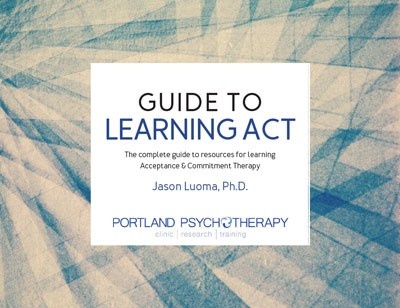Acceptance and Commitment Therapy Resources for Therapists
A Brief Overview of ACT
Acceptance and Commitment Therapy or “ACT” (said as one word) ACT is an evidence-based cognitive-behavioral therapy and has garnered significant empirical support for treating a wide variety of psychological problems. ACT emphasizes such processes as mindfulness, acceptance, and values in helping clients overcome obstacles to living well. A basic assumption of ACT is that suffering is a normal and unavoidable part of human experience and that it is actually people’s attempts to control or avoid their own painful experiences that lead to much long-term suffering. ACT helps people learn ways to let go of the struggle with pain, be more mindful, get clarity on what really matters to them, and to commit to living full, vibrant lives. The goal of therapy is not to eliminate certain parts of one’s experience of life, but rather to learn how to experience life more fully, without as much struggle, and with vitality and commitment.
ACT Therapist Resources
Guide to Learning ACT
For a complete guide to all the ACT books, resources, and guidelines for learning ACT, you can get our free downloadable ebook by clicking on the button below.
Get The Guide
ACT Values Greatest Hits
We’ve put together some scripts and guidelines for how therapists can conduct our seven favorite values exercises from ACT.
DownloadAudio Recordings and Exercises
We've compiled a series of links to Acceptance and Commitment Therapy resources such as audio files, meditations, and exercises.
View ResourcesACT Case Conceptualization Form
You can find an ACT case conceptualization form and other training resources on the personal website of Dr. Jason Luoma. He typically recommends therapists use this outline with at least two ACT clients when they are first learning ACT. I think it can be useful to help one get a beter idea of how to apply ACT to unique aspects of a particular client’s life.
Learn More About ACT
One of the unique aspects of ACT is the community which supports its development and dissemination. The community of practitioners and researchers working to develop ACT has gone through an intentional process focused on creating an open and nonhierarchical community called the Association for Contextual Behavioral Science (ACBS). The ACBS website provides an incredible wealth of information and resources on ACT and other contextual behavioral sciences including treatment protocols, client handouts, training videos, and topic specific listservs.
With membership to ACBS, which has “values-based dues” starting at about $13, you can get access to all these ACT, RFT, and CBS resources along with a subscription to the Journal for Contextual Behavioral Science.
More on ACT
ACT’s take on human suffering
As those of us who work in mental health know, suffering is a basic fact of life. But for humans, suffering is not just about pain, psychological or otherwise. We agonize over our painful memories, uncomfortable emotions, and difficult self-evaluations. We worry about them, dread them, and do all sorts of things to try to avoid them. In fact, many of the forms of psychological suffering we see in therapy, whether they be depression, anxiety, substance use, or others, can be seen as efforts to escape, avoid, control, or suppress emotions, thoughts, memories, and other private experiences (seminal paper: Experiential Avoidance and Behavioral Disorders –abstract | pdf)
ACT contends that the main culprit for humans’ unique ability to suffer in these ways is language. ACT is based on a behavioral account of language and cognition called Relational Frame Theory (RFT). According to ACT and RFT, it is our uniquely human ability to language (that is, to think symbolically) that has allowed us to both dominate the planet and also suffer in ways that nonhuman animals do not. ACT, the applied technology resulting from RFT, attempts to help people circumvent language in those areas of life where it is less helpful, and strengthen the most useful aspects of language in the domains where it tends to be most helpful.
ACT versus traditional CBT
Acceptance and Commitment Therapy (ACT) seeks to increase psychological acceptance, the ability to contact negatively evaluated private experience, directly, fully, and without needless defense – while at the same time engaging in behavior that is in the service of chosen values. ACT is one of a “third wave” of behavior therapies that includes Dialectical Behavior Therapy (DBT), Functional Analytic Psychotherapy (FAP) , Mindfulness-Based Cognitive Therapy (MBCT), and Integrative Behavioral Couple Therapy (IBCT). What sets ACT and these other third wave approaches apart from traditional CBT (alá Beck or Ellis) is that rather than trying to directly change the content of thoughts, feelings, sensations, or memories, these therapies seek to change the function of those events and the individual’s relationship to them.
Empirical support for ACT
ACT is considered an evidence-based psychotherapy in that its practitioners and researchers are dedicated to the development of science and empirical evaluation of its effects. Relational Frame Theory (RFT), the theory on which ACT is based, is a result of a 30+ year program (hundreds of published studies) of basic research into the nature of language and cognition (). As of 2022 there were over 800 randomized controlled trials (RCT) of ACT published or in press. These RCTs include studies on ACT targeting a wide variety of psychological problems including depression, OCD, psychosis, chronic pain, smoking, school problems, burn out, panic, and substance abuse. ACT has been designated as an empirically supported treatment on the American Psychological Association Division 12 list of empirically-based treatments, and is listed as an evidence-based practice on SAMHSA’s National Registry of Evidence-based Programs and Practices.
One of the unique aspects of the ACT model is the reputed processes of change for ACT are holding up fairly well in mediational analyses, as compared to traditional cognitive-behavioral therapy. For those interested in more up-to-date research information on ACT and RFT please visit http://contextualscience.org/state_of_the_act_evidence

